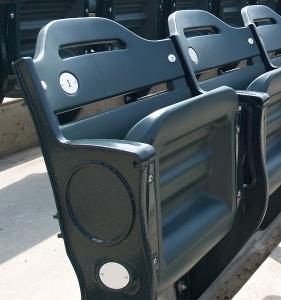
Two articles in today’s Journal Gazette, including an illustrated guide to Parkview Field.
TinCaps take care of VIPs who made park reality
By Benjamin Lanka | web link[…] Yet for the area’s politicians, getting tickets for themselves and family was as simple as accepting an offer. The TinCaps provided about 200 VIP tickets to various people, including those who worked daily on the project and members of the state legislature.
[…] Jason Freier, CEO of Hardball Capital, owner of the TinCaps, said he isn’t concerned about giving away a few tickets to the inaugural game because many people worked hard to make the ballpark a reality.
[…] He [Greg Leatherman, Redevelopment Executive Director] said most VIPs, including himself, were offered a set of four tickets to the game. Freier said most of the VIP tickets are for the fixed stadium seats stretching from first base to third base.
The city also reserved the right-field picnic area for its employees. Freier said the area seats about 700 people, and as of Tuesday there were fewer than 100 seats available.
If any picnic area seats weren’t bought – city employees had to pay for these seats – the team likely wouldn’t make them available to the public. […]
Inaugural VIPS
A partial list of who was invited to attend the first game at Parkview Field on Thursday. Not everyone invited has accepted.
- President Obama
- Gov. Mitch Daniels
- All area state senators and representatives
- Mayor Tom Henry
- Former Mayor Graham Richard
- Deputy Mayor Greg Purcell and former Deputy Mayor Mark Becker
- Controller Pat Roller
- Consultant Steve Brody
- Attorneys Joe Kimmell and Tim Haffner
- Allen County commissioners
- Members of the City Council, including former members Don Schmidt, Tom Hayhurst, Sam Talarico and John Crawford
- Members of the Redevelopment Commission, including former members Quinton Dixie and David Wright
- Other city executives who worked on the project
And an Op-Ed piece by Todd Maxwell Pelfrey, Executive Director of the History Center:
It’s fitting for TinCaps to honor historic figure
In this era of fanciful and disposable pieces of popular culture, thoroughly void of substance or relevance, the Fort Wayne TinCaps should be given the proverbial tip of the hat for their selection of a name and mascot so uniquely rooted in Fort Wayne’s past. And yes, one that has some historical accuracy.
[…] The popular image of a thickly bearded, shoddily dressed shoeless fellow crowned with a cast iron cooking pot, whimsically skipping through meadows and aimlessly flinging about apple seeds, belittles and misrepresents this incredibly complex and dynamic person.
[…] Arriving in Fort Wayne around 1830 on a pirogue laden with sacks full of apple seeds, he cared for at least four known apple orchards in Allen County, carefully positioned along the fertile and accessible Maumee River. The largest of Chapman’s nurseries in Allen County contained more than 15,000 apple trees, a gigantic enterprise even by the standards of today’s mechanized agriculture.
But for all the varying images of Johnny Appleseed as rugged businessman, unkempt beggar, itinerant mystic or roving planter, one feature of the man transcends all of these descriptions and captivates our community and the world just as it did nearly two centuries ago: his hat. Let this historian go on record as stating that it is a historical fact that occasionally Johnny Appleseed did indeed place a cooking container made of tin on his head.
With more than 750 linear feet of archival materials in the historical collection of the History Center (to put that in perspective, if one stacked the Lincoln Tower on top of One Summit Square the total height would be just about as tall as the stack of papers from our archives) there are two – only two – eyewitness accounts of Johnny Appleseed wearing a tin cap.
Was it a tin hat?
The first account is from John Dawson, a local newspaper editor and contemporary of Johnny Appleseed, observing that “his headgear was rarely ever alike for a long time.” More than once, Dawson saw Johnny Appleseed with “a tin vessel worn on his head, which he used to cook his frugal meals in.” Dawson goes on to note that sometimes Johnny Appleseed would wear multiple layers of hats where “he carried his Testament and Swedenborgian books,” placing his cooking pot atop the amalgamation.
The second account comes to us from the Johnny Appleseed Educational Center and Museum at Urbana University, Ohio. John Henry Cook of Ohio similarly observed Johnny Appleseed’s “pyramid of three hats, enabled him to carry not only his kettle but his treasurers of sacred literature.” Known to be a devout adherer to the Church of New Jerusalem (Swedenborgianism), Johnny Appleseed’s only true worldly possessions were his Bible and Swedenborgian tracts, which he kept dry and safe on his head beneath his waterproof tin cap. Without a printing press for hundreds of miles, preserving his religious papers and books for distribution to settlers was essential in allowing him to deliver “news right fresh from Heaven,” as he fondly described his preaching.
[…] But what matters is that in a time when spin is the norm and context goes out the window, fans of the newly rechristened TinCaps will be exposed to a small glimmer of truthful history. Good history is hard to find nowadays; people should take it any way they can.
Well said, Mr. Pelfrey!















